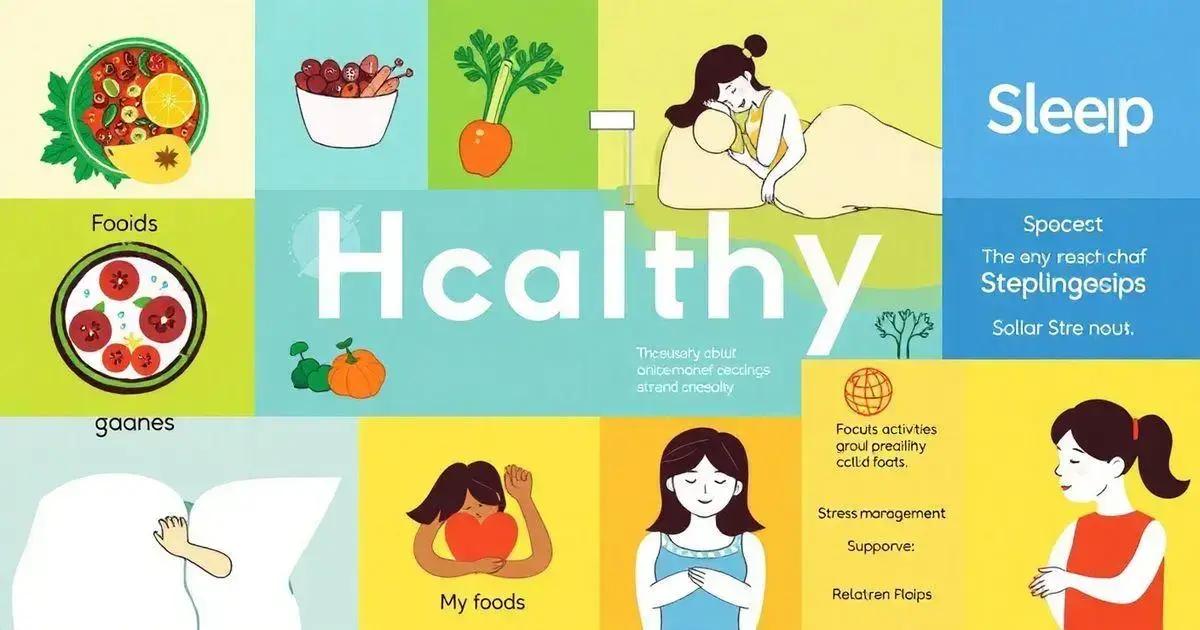Achieving better health starts with following Healthy Lifestyle Advice that promotes balance and well-being. Setting realistic health goals helps create sustainable habits, making it easier to stay motivated and committed to a healthier routine. Small, consistent changes can lead to long-term improvements.
Proper nutrition and regular physical activity are key components of Healthy Lifestyle Advice. Eating a well-balanced diet fuels your body, while exercise boosts energy levels and reduces the risk of chronic diseases. Managing stress and getting enough sleep also play a crucial role in maintaining overall health.
Following Healthy Lifestyle Advice can transform your daily life, improving both physical and mental well-being. Keep reading to explore practical tips and strategies that will help you build lasting, healthy habits.
Why Healthy Lifestyle Advice is Important
Understanding why healthy lifestyle advice is important is the first step towards achieving better health and well-being. Making informed choices can greatly enhance your quality of life. By focusing on a healthy lifestyle, you can prevent many illnesses and improve your mental health.
Preventing Health Issues
One major reason to follow healthy lifestyle advice is to decrease the risk of chronic diseases. Conditions such as obesity, diabetes, and heart disease are often influenced by lifestyle choices. Eating well and staying active can significantly lower your chances of developing these conditions.
Mental Well-Being
In addition to physical health, a healthy lifestyle also supports your mental well-being. Regular exercise and a balanced diet have been proven to reduce symptoms of anxiety and depression. When you prioritise your health, you create a positive cycle that enhances both your mind and body.
Energy and Productivity
By adopting healthy habits, you will likely notice an increase in your energy levels. Better nutrition and regular physical activity can boost your stamina and improve cognitive function, making you more productive in daily activities.
Longer Lifespan
A commitment to healthy living can also lead to a longer lifespan. Studies indicate that those who have healthy lifestyle habits tend to live longer, happier lives. By investing in your health today, you are ensuring a brighter future.
Community and Social Benefits
Choosing a healthy lifestyle can also lead to stronger community ties. Engaging in group activities such as sports or fitness classes can help you connect with others who share similar values. Building a support network encourages motivation and accountability on your health journey.
Key Components of a Healthy Lifestyle

Following Healthy Lifestyle Advice is essential for overall well-being. By focusing on key areas like nutrition, physical activity, and stress management, you can build a strong foundation for a healthier life. Small, consistent changes can lead to lasting improvements.
Balanced Nutrition
Eating a variety of nutrient-rich foods supports energy levels and overall health. A well-balanced diet filled with fruits, vegetables, whole grains, lean proteins, and healthy fats is a core part of Healthy Lifestyle Advice.
Regular Physical Activity
Staying active enhances cardiovascular health, strengthens muscles, and boosts mood. Aim for at least 150 minutes of moderate exercise per week, such as walking or cycling. Regular movement is a key part of Healthy Lifestyle Advice for long-term wellness.
Quality Sleep and Stress Management
Good sleep is crucial for brain function and immune health. Adults should aim for 7-9 hours per night. Stress management techniques like meditation, mindfulness, and yoga also contribute to a balanced lifestyle, reinforcing the importance of Healthy Lifestyle Advice.
Hydration and Avoiding Harmful Substances
Drinking enough water improves digestion and circulation. Limiting alcohol, avoiding smoking, and reducing processed foods further support overall health. These habits align with Healthy Lifestyle Advice, ensuring your body functions at its best.
Regular Check-ups and Supportive Relationships
Routine health check-ups help detect potential issues early. Surrounding yourself with supportive friends and family enhances emotional well-being. Maintaining these connections is a vital aspect of Healthy Lifestyle Advice, encouraging long-term commitment to good health.
By following Healthy Lifestyle Advice, you can create lasting, positive habits that improve your quality of life. Start making small adjustments today for a healthier and more fulfilling future!
Nutrition Tips for a Balanced Diet
Nutrition tips for a balanced diet play an essential role in maintaining your health. Here are practical tips to guide you in making healthier choices.
Choose Whole Foods
Always opt for whole and minimally processed foods. These foods, like fruits, vegetables, whole grains, and lean proteins, are packed with nutrients and free from added sugars and unhealthy fats.
Plan Your Meals
Planning your meals can help you make better food choices. By preparing meals in advance, you can avoid unhealthy snacks and save time during busy days.
Eat a Variety of Foods
Incorporate a wide range of foods into your diet. Each food has different nutrients, so a diverse diet ensures you get all the essentials your body needs.
Control Portion Sizes
Being mindful of portion sizes is crucial for maintaining a healthy weight. Use smaller plates and bowls to help control how much you eat. Remember, it’s okay to have seconds, but listen to your body’s hunger cues.
Stay Hydrated
Drink plenty of water throughout the day. Staying hydrated supports body functions and can reduce feelings of hunger, helping you avoid unnecessary snacking.
Limit Sugary and Processed Foods
Reducing your intake of sugary and processed foods can improve your health significantly. Instead, choose natural alternatives, like fruits, for satisfying your sweet tooth.
Include Healthy Fats
Incorporate healthy fats into your diet, such as avocados, nuts, and olive oil. These fats are beneficial for heart health and can help you feel full.
Be Mindful When Eating
Practice mindful eating by paying attention to flavors and textures. Avoid distractions like TV or smartphones during meals to enhance your eating experience and promote better digestion.
The Role of Physical Activity

The role of physical activity is vital for maintaining a healthy lifestyle. Engaging in regular exercise not only promotes physical health but also has numerous mental and emotional benefits.
Improves Physical Health
Regular physical activity strengthens your heart, lungs, and muscles. It helps improve your endurance and flexibility, reducing the risk of injury. Aim for at least 150 minutes of moderate aerobic activity each week for optimal health.
Boosts Mental Well-Being
Exercise releases endorphins, chemicals in the brain that act as natural painkillers and mood elevators. This can help reduce feelings of anxiety and depression, leading to a more positive outlook on life.
Aids Weight Management
Staying active is crucial for managing your weight. Combining physical activity with a balanced diet can help you achieve and maintain a healthy weight. Activity burns calories, which is important for weight loss and upkeep.
Enhances Sleep Quality
Regular physical activity can improve the quality of your sleep. Engaging in exercise during the day makes it easier to fall asleep and stay asleep longer. Aim to complete your workout earlier in the day for the best results.
Increases Energy Levels
Staying physically active can boost your overall energy levels. Regular exercise can improve your stamina and help you feel less fatigued throughout the day. It also increases circulation, delivering more oxygen and nutrients to your muscles.
Social Interaction
Participating in group activities or classes can help you meet new friends and create social connections. This social interaction can enhance your motivation to stay active and make exercise more enjoyable.
Builds Healthy Habits
Incorporating physical activity into your daily routine helps establish healthy habits. Plan activities throughout the week that you enjoy, making it easier to stick with your fitness goals.
Reduces Stress
Physical activity is an effective way to manage stress. Exercise provides a healthy outlet for frustration and helps clear your mind, making it easier to tackle life’s challenges.
Managing Stress Effectively
Managing stress effectively is essential for maintaining a balanced and healthy lifestyle. Here are practical strategies to help you cope with stress.
Identify Stressors
The first step in managing stress is to identify what is causing it. Keep a journal to track your stress levels and note what triggers your anxiety. Understanding your stressors can help you avoid or address them more directly.
Practice Mindfulness
Mindfulness practices such as meditation or deep breathing exercises can help you focus on the present moment. This can reduce feelings of stress and anxiety by allowing you to step back from your worries.
Exercise Regularly
Physical activity is an excellent way to relieve stress. Aim for at least 30 minutes of exercise most days of the week. Activities like walking, yoga, or dancing can enhance your mood and promote relaxation.
Establish A Healthy Routine
Creating a daily routine can provide a sense of normalcy in your life. Set aside time for work, relaxation, and activities that bring you joy. A balanced schedule can help reduce stress by creating stability.
Stay Connected
Maintain relationships with friends and family. Talking to others about your feelings can be a great way to relieve stress. Social support is essential for coping with life’s challenges, so don’t hesitate to reach out for help.
Limit Caffeine and Alcohol
Reducing your intake of caffeine and alcohol can help manage stress levels. Both can increase feelings of anxiety or disrupt sleep, making stress harder to handle. Opt for water or herbal teas instead.
Get Enough Sleep
Sleep plays a significant role in stress management. Aim for 7 to 9 hours of quality sleep each night. Poor sleep can exacerbate stress, while good sleep helps improve mood and energy levels.
Set Realistic Goals
Break tasks into smaller, manageable steps to avoid feeling overwhelmed. Setting realistic and achievable goals can help you feel more accomplished and less stressed. Celebrate your successes, no matter how small.
Building Healthy Habits

Building healthy habits is essential for a sustainable lifestyle. Here are effective strategies to help you develop and maintain positive habits.
Start Small
Begin with small, manageable changes. Instead of overhauling your entire routine, focus on one habit at a time, such as drinking more water or taking short walks. This makes it easier to stick with your new habits.
Be Consistent
Consistency is critical when developing healthy habits. Aim to practice your new habit daily or at specific intervals. Over time, this repetition will help it become a natural part of your routine.
Track Your Progress
Keeping a journal or using an app to track your progress can motivate you to stay on course. Record your achievements, no matter how small, to see how far you have come and reinforce your commitment.
Set Clear Goals
Define clear and specific goals for your habits. Instead of saying, “I want to exercise more,” try stating, “I will go for a 30-minute walk three times a week.” Specific goals make it easier to measure progress and stay accountable.
Reward Yourself
Incorporate rewards for completing your goals. Treat yourself to something enjoyable, like a movie night or a small gift, to encourage your healthy habit formation. Celebrating success boosts motivation.
Find a Support System
Sharing your goals with friends or family can create a supportive environment. Consider finding a buddy to join you in adopting healthier habits. Having someone to support and encourage you can make the process easier.
Stay Flexible
Life can be unpredictable, and it’s essential to adapt your habits when necessary. If you miss a day or need to adjust your routine, don’t be hard on yourself. Acknowledging the need for flexibility will help you stay committed in the long run.
Reflect and Adjust
Set aside time to reflect on your habits occasionally. Assess what is working and what isn’t, and be open to adjusting your approach. This self-reflection will help you maintain a mindset of growth and improvement.
Sleep’s Impact on Health
Sleep’s impact on health is profound and often underestimated. Quality sleep is essential for overall well-being and plays a crucial role in various body functions.
Physical Health
Getting enough sleep helps the body recover. During sleep, important processes such as tissue repair, muscle growth, and hormone regulation occur. A lack of sleep can lead to problems such as heart disease, obesity, and diabetes.
Mental Clarity
Good sleep improves cognitive function. Sleep helps with memory consolidation, allowing you to retain information better. It also supports problem-solving skills and creativity, making you more effective in your daily tasks.
Mood Regulation
Sleep affects your mood significantly. Lack of proper rest can lead to irritability and increased stress levels. Good sleep hygiene promotes emotional stability and helps reduce symptoms of anxiety and depression.
Immune Function
Your immune system relies on sleep to function effectively. Sufficient sleep enhances your body’s ability to fight off infections and illnesses. Studies have shown that poor sleep can weaken immunity, making you more susceptible to sickness.
Weight Management
There is a strong connection between sleep and weight management. Sleep deprivation can alter hormones that control appetite, leading to increased hunger and cravings for unhealthy foods. This can contribute to weight gain over time.
Healthy Aging
Proper sleep is crucial for healthy aging. Quality sleep helps reduce the risk of age-related conditions like cognitive decline and chronic diseases. Older adults who prioritise sleep tend to enjoy better overall health.
Sleep Hygiene Practices
Improving sleep quality is possible with good sleep hygiene. Create a calming bedtime routine, maintain a consistent sleep schedule, and create a comfortable sleep environment to enhance your sleep quality.
Understanding Sleep Disorders
Sleep disorders such as insomnia and sleep apnea can severely impact health. If you struggle with sleep, consult a healthcare professional to address any underlying issues.
Setting Realistic Health Goals

Following Healthy Lifestyle Advice begins with setting achievable health goals. Defining clear objectives helps you stay focused on what matters, whether it’s improving fitness, losing weight, or enhancing mental well-being. Being specific about your goals ensures a stronger commitment to your health journey.
Use the SMART Criteria
Applying the SMART framework is essential in Healthy Lifestyle Advice. Goals should be Specific, Measurable, Achievable, Relevant, and Time-bound. Instead of saying, “I want to get fit,” specify, “I will jog for 20 minutes, three times a week for the next month.”
Start Small and Track Progress
Small, manageable steps are key to long-term success. Healthy Lifestyle Advice encourages gradual changes, such as losing 1 kilogram per week instead of aiming for extreme weight loss. Tracking progress through journals or apps helps maintain accountability and motivation.
Stay Flexible and Seek Support
Life is unpredictable, so adapting goals when necessary is crucial in Healthy Lifestyle Advice. If challenges arise, modify your goals rather than abandoning them. Surrounding yourself with supportive friends, family, or professionals can provide encouragement and accountability.
Focus on the Process
Shifting your mindset from results to daily habits is a vital part of Healthy Lifestyle Advice. Prioritizing healthy eating, regular exercise, and mindful choices ensures progress while making the journey more enjoyable.
Reflect and Adjust as Needed
Regularly evaluating your goals helps determine what’s working and what isn’t. Healthy Lifestyle Advice emphasizes adjusting objectives to align with your evolving needs, ensuring a balanced and sustainable path to well-being.
Transform Your Health with Realistic Goals
Incorporating healthy lifestyle advice is essential for improving your overall well-being. From setting realistic health goals to managing stress, proper nutrition, and regular physical activity, each aspect plays a vital role in your health journey.
Emphasising sleep’s importance and building healthy habits can significantly enhance your quality of life. Remember, achieving better health is a gradual process that requires commitment and adaptability.
By following the strategies outlined in this guide and being patient with yourself, you can successfully transform your lifestyle and unlock a healthier, happier you.
Check out our article on Social Connection to explore the importance of building meaningful relationships and fostering a sense of community in today’s world.
